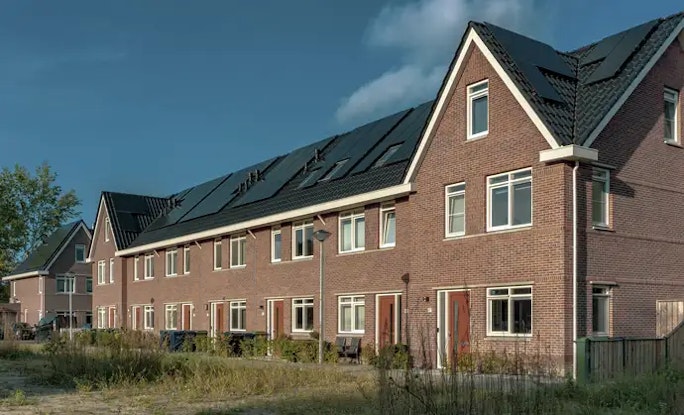Table of contents
The purchase of new construction is a bit different from buying an existing house. Therefore, you also encounter different costs. In this article, we list the costs of buying a new construction house so that you can have your dream home built well-prepared.
You buy a new construction house with no additional costs
A new construction house is usually bought with no additional costs. This means that you do not pay buyers costs on top of the purchase price. The following costs are already included in the purchase price of the new construction home:
- the notary fees for the transfer deed (you still have to pay separate notary fees for the mortgage deed)
- the costs for registering the ownership of the house with the Land Registry
- the 21% VAT that you pay on the purchase price
So you actually pay for these costs, but not on top of the purchase price (as you do when buying an existing home).
Which costs do you not incur with new construction?
When you buy a new construction home, you do not incur the following costs:
- You do not have to pay transfer tax, because you are the first owner of the house.
- You do not have to have an appraisal report drawn up, because the purchase price in a new construction project is usually already fixed. The selling price is based on construction costs, land prices, and a profit margin. The value is therefore estimated in advance by the developer or contractor.
- You do not have to incur costs for renovations or overdue maintenance because the house is brand new and delivered to your taste.
Want to know what the costs are of buying an existing construction? You can read about it on our page about the costs of buying a house.
Additional costs when buying new construction
Besides the payment of the purchase price, you will encounter several additional costs. Below you will read about the costs you can take into account. On average, you can expect to spend 9% in additional costs on top of the purchase price. The actual amount, of course, depends on the specific circumstances.
The additional costs can be divided into 5 sections:
- Costs for the purchase of the house
- Costs for the mortgage
- Costs for the delivery
- Costs for the real estate agent
- Costs for the new construction house itself
Because you already incur costs for the new construction home while it is being built, most people temporarily face double housing costs. This means you have to finance both your current and your new home simultaneously, unless you stay ‘for free’ with family or friends.
Read more about financing double housing costs
Costs for the purchase of the house
In addition to the purchase price, you have to pay several additional costs for the purchase of your new house. First, you pay construction interest to the contractor. This is a fee for financing the construction costs. You may also encounter delay interest.
Construction interest
The construction interest is a percentage of the purchase price that you pay to the contractor. The contractor can set the percentage himself, usually somewhere between 4% and 8%. You can negotiate the construction interest in advance. A real estate agent can advise and support you in this. The construction interest can consist of two components: the financing compensation and the postponement interest.
The financing compensation is the interest that the contractor can charge for the period before the purchase-construction agreement was concluded. The amount includes the costs incurred by the contractor up to that point, such as purchasing the land from the municipality and preparation costs. Additionally, an amount for interest is charged.
If the contractor decides to charge a financing compensation, this amount is part of the purchase price. Therefore, the financing compensation is not tax-deductible.
The postponement interest is the interest that the contractor charges for the period between signing the purchase-construction agreement and the moment of property transfer. You pay this postponement interest on top of the purchase price amount. Unlike the financing compensation costs, these interest costs are tax-deductible.
Postponement interest is used because otherwise, the contractor would only receive money at the time of property transfer. Construction projects can take a long time, and many costs are incurred. With the postponement interest, expenses like land costs and part of the purchase price can be paid in advance.
Delay interest
It is essential to pay the contractor's invoices on time. If you do not pay the invoices within the specified period, you will have to pay delay interest. The amount of this interest can vary per contractor. These costs are avoidable, so be alert to paying the invoices on time.
Costs for the mortgage
Most people need a mortgage for purchasing a new construction home. As a result, you also incur costs for the new construction mortgage. Below you can read more about the possible costs for the mortgage on new construction.
Are you able to purchase a home without a mortgage, but unsure if it's a good idea? In our article about buying a house without a mortgage, you can read all about the advantages and disadvantages.
Costs for mortgage advice
The first mortgage consultation with a mortgage advisor is often free. If you actually hire the advisor, they will charge you for their services. How much the advisory and brokerage fees are varies per mortgage advisor. We recommend working with an independent mortgage advisor. On average, they charge amounts between €2500 and €4000.
Read more about the costs of mortgage advice
Notary fees for registering the mortgage deed
When you take out a mortgage with a lender, a deed must be signed at the notary. The notary ensures that this mortgage deed is registered with the Land Registry. They charge costs for this. Keep in mind an amount between €500 and €1000. The notary who handles this registration usually also arranges the transfer of ownership of the new construction house.
Commitment fee
Mortgage offers are only valid for a certain period. Because new construction projects often take a long time, the mortgage offer may expire during construction. The mortgage lender charges a fee for extending the offer. This is called the ‘commitment fee’. The costs for this vary per mortgage lender.
You usually pay a monthly percentage of 0.20% or 0.25% of the borrowed amount. To minimize the risk of paying the commitment fee, ensure the mortgage offer has the longest possible validity period when you take out the mortgage. Your mortgage advisor can help you with the negotiations.
Guarantee fee for a mortgage with NHG
Do you have a mortgage with NHG? Then you benefit from lower mortgage rates and have a safety net if you can no longer pay the mortgage due to circumstances such as unemployment or divorce. The one-time costs for NHG amount to 0.6% of the total mortgage amount, even for new construction. These costs are called the ‘guarantee fee’.
Mortgage interest during construction period
When you take out a new construction mortgage, part of the mortgage amount is deposited into a construction deposit. This deposit is intended for the payment of work yet to be carried out by the contractor. Invoices from the contractor are paid from this construction deposit, causing the balance to gradually decrease.
You usually receive about the same amount of interest on the balance of the construction deposit as you pay in mortgage interest. But because the amount in the construction deposit decreases, you earn less and less interest on your balance, while the mortgage interest remains the same. As a result, your monthly costs increase as the construction deposit empties.
Bridge mortgage
Do you need a bridge mortgage to use the equity from your old house for financing your new construction home? On our page about the bridge mortgage, you can read about the associated costs.
Costs for the delivery
Once you have signed the transfer deed at the notary, you are officially the owner of the new construction home. Afterward, the delivery takes place, during which you inspect the house and can report any defects or deviations. You can check the house yourself (together with your real estate agent), but most people choose to have a delivery inspection performed.
Delivery inspection
If you have a delivery inspection carried out by an independent party (which is certainly recommended), a professional will assess the state of the property and whether everything has been delivered according to the agreements. Such a delivery inspection usually costs between €200 and €300. On average, a house (unfortunately) is delivered with several defects, so this is certainly worthwhile.
The contractor must then sign to acknowledge that he will fix the defects. To accelerate the repair, you can use the 5% rule. In our article on buying a new construction home, you can read more about this.
As the delivery date approaches, it's wise to put your current home on the market. This can also be done at an earlier or later time, depending on what feels right for you. On our page about selling a house with new construction, you can read more about this.
Costs for the real estate agent
If you have used the services of a real estate agent, you will pay them a commission. This is usually a percentage of the purchase price. The commission varies per real estate agent and region. It usually ranges between 1% and 2% of the purchase price if you choose full-service. If you only opt for partial services, the rates are lower.
Read more about the costs of a real estate agent
Costs for the new construction house itself
Once the house has been delivered, there are always some tasks you need to complete before you can move in. What tasks you take on and how expensive you make them is up to you. You may incur costs for the following:
- Painting and wallpapering
- The garden and outdoor space, such as planting and paving
- Installing a boundary fence
- Buying new furniture
- Additional work
- Moving costs
Additional work
New construction projects often have a standard layout. If you want to add things (additional work) or have things differently, there are costs involved. Make sure to finalize the list of additional work with the contractor before you sign the purchase-construction agreement so that the costs of the work are clear. You can then negotiate rates where necessary. Your real estate agent can assist you with this.
If you find the costs for the additional work too expensive, you can also choose to carry out certain tasks yourself or have them done by another contractor. But be aware: the new construction contractor probably won't allow other contractors to start work during construction. The tasks can only be taken on after delivery.
Will the house be delivered as a shell?
If a new construction home is delivered as a shell, there are extra costs you should consider. Think about costs for:
- The kitchen: purchasing and installing a complete kitchen, including appliances such as a stove, oven, refrigerator, dishwasher, and extractor hood.
- The bathroom and toilet: furnishing the bathroom(s) and toilet(s), including sanitary ware such as a shower, bath, sink, toilet, tiles, and possibly a washing machine connection.
- The floors: laying floors throughout the house, such as laminate, parquet, tiles, or carpet.
- The walls: finishing the walls, such as plastering, painting, or wallpapering.
- Electricity and lighting: installing electricity and placing lighting, sockets, and switches.
- Heating and ventilation: installing heating systems and ventilation, such as radiators or underfloor heating.
- The doors and frames: installing interior doors, frames, and possibly additional windows.
- Connecting water, gas, electricity, sewage, and internet.
- Any permits: permits that may be needed for certain modifications or extensions.

The benefit of a good real estate agent
A real estate agent can help you find a suitable new construction home and map out the costs and potential risks. By seeking good advice, you avoid surprises and can set a realistic budget for purchasing your home.
Many real estate agents work as sales and purchase agents. This means they can help you with both the sale of your old home and the purchase of your new home. If you are satisfied with the services of the office, it can be convenient and advantageous to stay with the same party, as they are already familiar with your situation and preferences.
Are you looking for a reliable real estate agent with good reviews? Sign up with us and compare the best real estate agents in your search area. If you wish, you can also schedule a free consultation with a mortgage advisor.
- Receive proposals from multiple real estate agents
- Get clarity on costs in advance
- Choose based on performance and results
- Over 3000 people have gone before you
- On average, 2% higher sales proceeds
- Free & without obligation
- Independent
- Without obligation
- Free
- Fast
Do you have questions about our service? Read how it works or contact us!

















